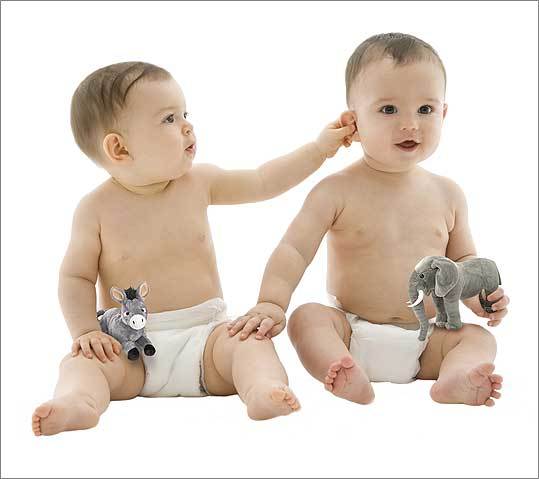Read the rest of this article.Born to party
New research suggests that our basic political attitudes - liberal, conservative, or otherwise - are with us at birth. What does this mean for our democracy?
By Eve LaPlante
(Nancy Brown/Getty Images, Globe Staff Illustration)
November 2, 2008
As we cast our vote for president on Tuesday, we may imagine that our choice is based on a thoughtful consideration of the issues, shaped, perhaps, by past experience and our circumstances, such as where we live and whom we speak with. In large part, we assume, our vote is something over which we exert conscious, mental control. Media coverage reinforces this assumption, with "Decision '08" monikers and endless charts of candidates' positions and party platforms. Indeed, our vision of democracy is founded on the belief that voters actually consider both candidates and make a rational decision as to which one is best for America.Yet scientists are now discovering that our political attitudes have deep roots in our biology. Our place on the political spectrum - liberal, conservative, or in between - is powerfully influenced by genetics, new studies show. In the past year, researchers have demonstrated that the brains of liberals and conservatives are physically and functionally distinctive, suggesting that people on either side of the ideological divide are actually wired differently. And new research, published this fall in the prestigious journal Science, found that our immediate, unconscious reaction to threat - how much we startle at frightening images and noises - determines our political views on specific issues like gun control, national defense, the Iraq war, domestic surveillance, the torture of political prisoners, and even immigration.
"Political reactions are gut responses rather than a rational weighing of pros and cons," said Kevin Smith, a University of Nebraska political scientist who coauthored the Science study. "Our research shows that these reactions are so deep-seated, they're partly biological. Our biological makeup contributes to our political attitudes."
The work of Smith and his colleagues is driving an emerging field, sometimes called "political physiology," that challenges traditional views of politics. There is still room for a considered examination of issues. But the new research suggests we are not merely swayed, here and there, by emotional appeals. Our fundamental political framework is shaped by gut feelings with deep biological roots. Much of the research into political ideology points to the central role of the limbic system, which contains some of the brain's oldest structures, in an evolutionary sense, and is responsible for such instinctive functions as smell, sexual response, and fear.
What emerges is a new view of politics as remarkably visceral and, to some extent, inherited, which may limit the possibilities for agreement across the classic divides - red state vs. blue state, conservative vs. liberal. When we debate issues, in other words, we do not so much argue a political position as assert who we are.
"Those who want an end to political bickering will have to come to terms with the fact that being conservative or being liberal is often genetically based and therefore unlikely to be jawboned or reformed away," said John Alford, a Rice University political scientist who is involved in the new field.
Offering multiple perspectives from many fields of human inquiry that may move all of us toward a more integrated understanding of who we are as conscious beings.
Pages
▼
Tuesday, November 11, 2008
Born to Party? (Political, That Is)
Eve LaPlante wrote interesting article for the Boston Globe. Are we born a Democrat or a Republican, or, more rarely, a Libertarian or Constitutionist?
Tags:
No comments:
Post a Comment